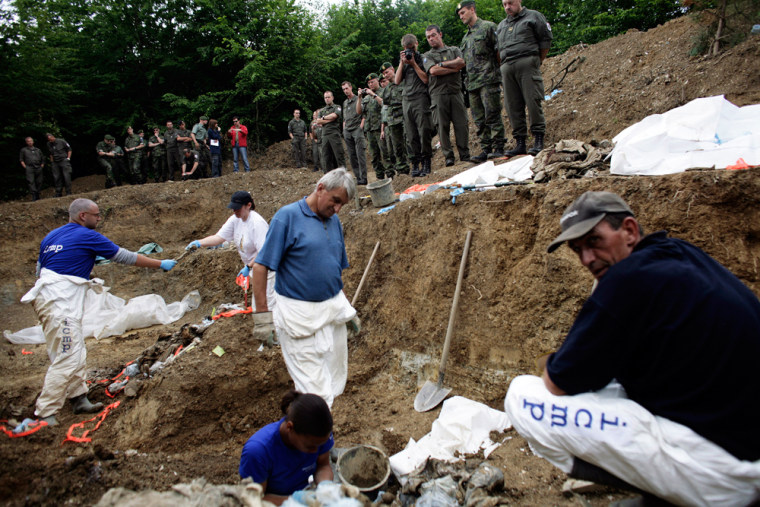A Dutch court began hearings Wednesday about whether survivors of a 1995 massacre of Muslims in Bosnia — Europe's worst mass killing since World War II — can sue the United Nations for failing to prevent the slaughter.
Serb forces killed more than 8,000 Muslims in one week in July 1995, overrunning the Srebrenica enclave declared a U.N. safe zone. Dutch peacekeepers overwhelmed by the Serbs' superior force watched helplessly as the male victims were led away from their custody for execution.
The Mothers of Srebrenica, survivors of the men and boys killed in 1995, are among those seeking compensation from the U.N. and the Dutch state in the civil lawsuit.
Presiding Judge Hans Hofhuis said the hearing would focus solely on the question of whether the court has jurisdiction in a case concerning the United Nations, which so far has refused to take part in the proceedings launched in 2007.
U.N. immunity?
Allaart van Blankenstein, a lawyer representing the Dutch state, argued that the U.N. charter, endorsed by all its members, grants the U.N. immunity from prosecution in national courts. Any exception would "have large consequences for future peacekeeping missions anywhere in the world," he told the three judges of The Hague District Court.
He insisted that the Dutch state and U.N. did "everything in their power" to prevent the massacre. "The ones who carried out this massacre are the ones who are to blame," he said.
Axel Hagedorn, whose firm says it represents 6,000 family members in the unusual class action suit, said before the hearing began that he believed the U.N.'s immunity would not be applicable.
Lawyers earlier cited a figure of $4 billion as a starting point for compensation negotiations.
He said if the Dutch court refused to hear the suit, it would leave the victims with no venue for their claims, in contravention of international treaties on genocide.
The suit is one of several seeking to determine whether the Netherlands and United Nations can be held liable for failing to carry out a promise to protect civilians in the U.N. enclave.
An independent report by the Netherlands Institute for War Documentation in 2002 placed partial blame on the Dutch government for sending ill-prepared troops on an impossible mission. It faulted the U.N. for designating the area a "safe haven" for Bosnian war refugees without defining what that meant.
The report led the Dutch government then in power to resign, but the state denied liability for the murders, saying that rested with the Serb forces.
In a separate suit by two Bosnian Muslim families, the Dutch government argued that its soldiers did not commit any crimes, and lawsuits should be directed at the Serb forces that carried out the killings. A ruling is expected in September.
A court spokeswoman said a ruling on Wednesday's hearing on U.N. immunity would likely take months.
The U.N. war crimes tribunal, set up to prosecute war crimes committed during the breakup of the former Yugoslavia, is still seeking the two prime criminal suspects in the Srebrenica massacre: Gen. Ratko Mladic, who commanded Serb forces in Bosnia, and Radovan Karadzic, the top political leader of Bosnian Serbs.
